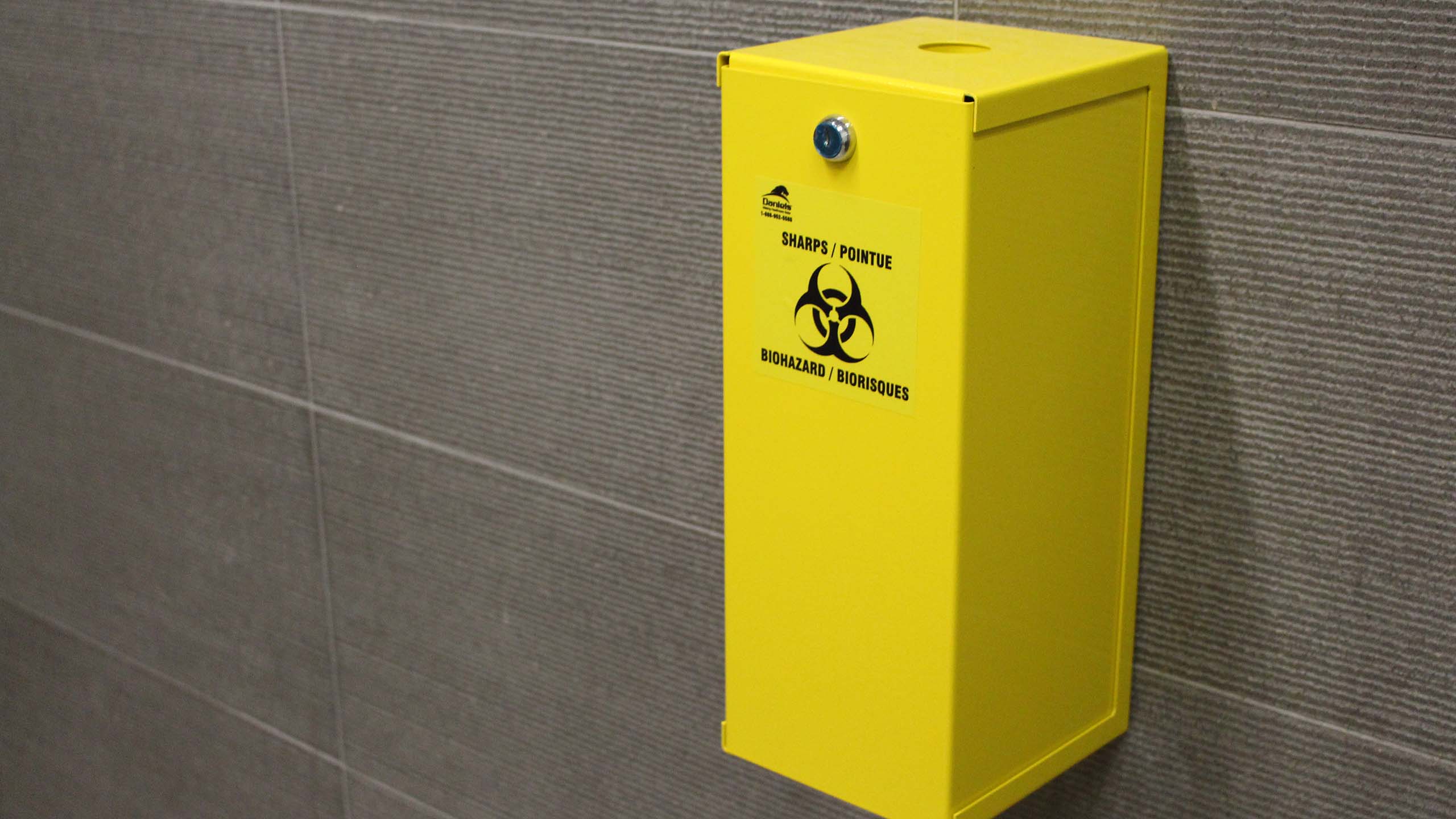By Michelle McNally
Devan Moura seldom finds a place to safely dispose of the sharps from his insulin pump. Due to the lack of disposal containers on campus, the fourth-year business management student has always carried his used needles and glucose testing pricks in his backpack.
“I don’t even bother looking for [a bin],” he said. “I usually just pack them back in my bag and take them home for disposal.”
The Sharps Containers Program, launched this week, hopes to provide a safe option for students like Moura to discard their needles.
The six-month pilot has introduced 18 medical disposal units to the highest-risk washrooms in Kerr Hall, the Student Learning Centre, the Victoria Building and Eric Palin Hall. According to Facilities Management and Development, the number of unsafely discarded needles, otherwise known as sharps, has been growing across campus. Stray needles are often found on washroom floors, in garbage bins and in bushes.
Geeta Sharma, the director of Environmental Health and Safety and Risk Management, says the Sharps Containers Program will test if disposal bins are an effective means to lower the number of unsafely-discarded needles on campus. In an email to The Eyeopener, Sharma confirmed the university will determine if the disposal bins will become permanent at the end of the six-month pilot.
“We will be closely monitoring the containers to see if they are being used and how often we have to replace the full bins”
“It is designed to help us assess if the containers will help us reduce the unsafe disposal of sharps, thereby reducing exposure to Ryersonians before deciding if this will be rolled out institutionally,” she wrote. “To that end, we will be closely monitoring the containers to see if they are being used and how often we have to replace the full bins.”
Accessibility to public sharp containers remains an everyday issue for diabetics. Those with type 1 diabetes require a continuous intake of insulin, sometimes needing between three to five insulin injections a day. Afraa Mustafa, the communications director of the Canadian Diabetes Association at Ryerson, hopes that the sharps disposal bins will stay for good.
“I feel like we’re moving in the right direction in terms of awareness and accessibility, but just like many universities, we need to do more work to increase accessibility,” she said. “I feel like this is something that should have been done a long time ago and something that should definitely stay permanent.”
Moura was diagnosed with type 1 diabetes in 2008 at 12 years-old. Before he switched to an insulin pump, Moura was prescribed four injections a day. While he believes the campus bins will be useful for those taking insulin injectables, he says they will not change his own disposal habits.
“I mean, the bins are nice to have I guess, but diabetics have been dealing with this kind of stuff their whole lives. We’re used to figuring out ways around it,” he said. “I feel like it won’t really change how I approach my diabetes on campus. I’ll probably keep packing my sharps back in my bag. It might come in handy a few times and I’ll end up using it.”
“We have had multiple employees using needles for insulin commend the pilot project”
Since the Sharps Container Program launched last week, Sharma says it received much praise by insulin users.
“Since the program was launched, we have had multiple employees using needles for insulin commend the pilot project and have received numerous requests to install additional units closer to them,” she said. “It’s great to hear feedback from students using the containers.
To those concerned that the pilot could encourage drug abuse on campus, Sharma says the nearby safe injection site at 277 Victoria St. will facilitate the needs of drug users. Tanya Poppleton, the manager of Ryerson Security and Emergency Services, said in an email that the bins are focused on addressing medical conditions.
“The bins are a means for services like security and community members with medical needs to safely dispose of these needles that are being left in garbages and flushed down toilets,” she said. “The purpose of these bins is to reduce the chances of being harmed by an exposed needle, so we believe they are effective in that manner.”
While only in its infancy, Mustafa says that the program is an important factor in helping diabetics self-manage their condition.
“It’s important that these individuals have accessibility and don’t have to hide it and can feel like the place where they spend most of their time, at university, have access.”













Leave a Reply